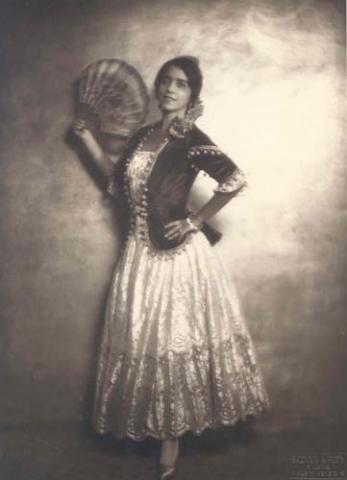
..this past week I presented the program Crossing A Barrier of Footlights, in which I spoke of Madame Lillian Evanti, the National Negro Opera Company and Mary Cardwell Dawson. …the second session, which took place at the Georgetown Library, was attended by students from the Filmore School, an arts curriculum public school. These students were eager and sharp as tacks; their questions were engaged and inquisitive; the adult audience that attended, responded to these students with delight and encouragement. The presentation of artifacts from Madame’s life (from the Evans-Tibbs collection, through the generosity of the Anacostia Community Museum, Smithsonian), was wonderful, and well received; many, who were unaware of this extraordinary woman’s presence, talent, and cultural impact, passed along the table of documents, to witness her ‘thoughts’ in letters to her mother, and deeds, in newsprint articles of the day, program notes, and images.
Madame Evanti as Rosina, in The Barber of Seville
Jennifer Morris, Archivist, was pleased in responding to the engagement of the audience, students and adults, and gave facilitating anecdotes in her orientation of the items she had with her, from the collection. All, as I said, went well..however, throughout this past week I have been acutely aware of the ‘past’, and feeling the importance of connecting the strength and legacy of these two artistic women; in the case of Madame Evanti, I have felt a special, more provoked compulsion.. It was eye opening to me, having the opportunity to research the archive, to find Madame Evanti’s breathless note to her mother, dated “1932”, speaking of her imminent “private audition” with the head of the Met. The fact is, her auditions continued, intermittently, throughout her career, and left an abundance of documentary evidence of her attempts. Another, very poignant example, comes in a letter from the General Manager of the Metropolitan Opera, to Mary McLeod Bethune, founder of the National Council of Negro Women; the letter is dated February 14, 1946. In it, Mr. Johnson, thanks Miss Bethune for her letter to him, and her “courteous comments towards the Metropolitan Opera”; he acknowledges knowing “the artist of whom you wrote, Miss Lillian Evanti .. having audition from the stage of the Metropolitan Opera House in the Spring of 1936”. Mr. Johnson goes on to say that the company, unfortunately, has “no opportunity for any additions” to their roster that year. -and yet, less than 3 weeks later, there is a letter to Madame Evanti, inviting her to “auditions” being held at the Met, “on Wednesday, March 13, 1946”; “if interested”, she is told to “please bring your own accompanist, and come to the Executive Offices entrance on 39th Street”. I imagine Madame went; there was no follow up dialogue on the audition. However, history tells us that she was not accepted. The story of the extraordinarily talented, and internationally acclaimed soprano, Madame Evanti, is not in its place in the spoken lore of history; the evidence of this artist’s single mindedness, and political network, is abundant; the continued, determined application to the leaders of the Metropolitan Opera, to engage this artist, is extraordinary, and speaks of a deepening pressure of politics, that will facilitate the entry of another, whose debut came in 1955, as Azucena, in the Met’s production of Verdi’s opera, Un ballo in maschera. This is a lesson in the reality of a gifted life; Madame is not on the roster of achievement and success, in the same way as Marian Anderson, and yet it is Madame who brought the weight to bear, that created the scruple and crack for her contemporary to move through. It was Madame, in the early 1930’s who was at the White House, giving a “command performance” to the President and First Lady, Franklin and Eleanor Roosevelt; it was Marian Anderson, thereafter. ..and in the context of my appreciating the thought of “those who come after” and enjoy the fruit of talented, unheralded pioneers (Camilla Williams also comes to mind).. –I found out something extraordinary.. Last fall, I had the pleasure of giving two presentations at the Deanwood Library, with the amazingly talented and generous artist, Elisabeth Stevens, whose breadth for Verdi is astonishing..
In December of 2011, Miss Stevens performed at the Teatro Verdi Sassari, in Sardegna, Italy; her role, Elvira –the prima donna of Verdi’s opera Ernani. This was Miss Steven’s initial presentation of this character, and her excitement at assaying it was uncontainable.
The performance was electric. In January this year, after the Italian production, while finally having the moment to catch up on a backlog of correspondence, Miss Stevens noticed a particular email, lagging in her Inbox; it was from the Metropolitan Opera- -asking her if she would be interested in “covering” the role of Elvira in their current (February 2012) production of Ernani! Two things: the Met reached out to her, ahead of her ever auditioning for them –and, more importantly –Miss Stevens said “yes”! She is now in New York, just in the wings, ready to step onstage in a split second. Whether it happens with circumstances in this production, or not, it will occur more easily, for the fact of history. For the grace of many, unheralded..

